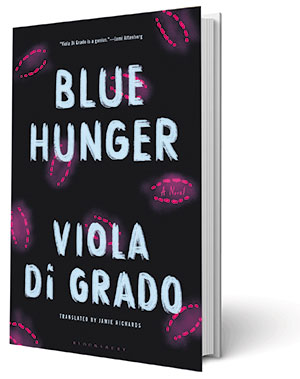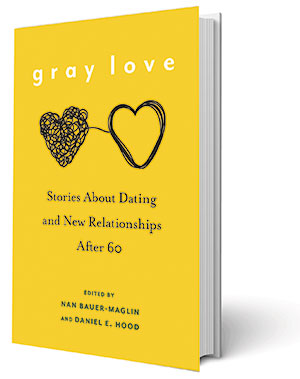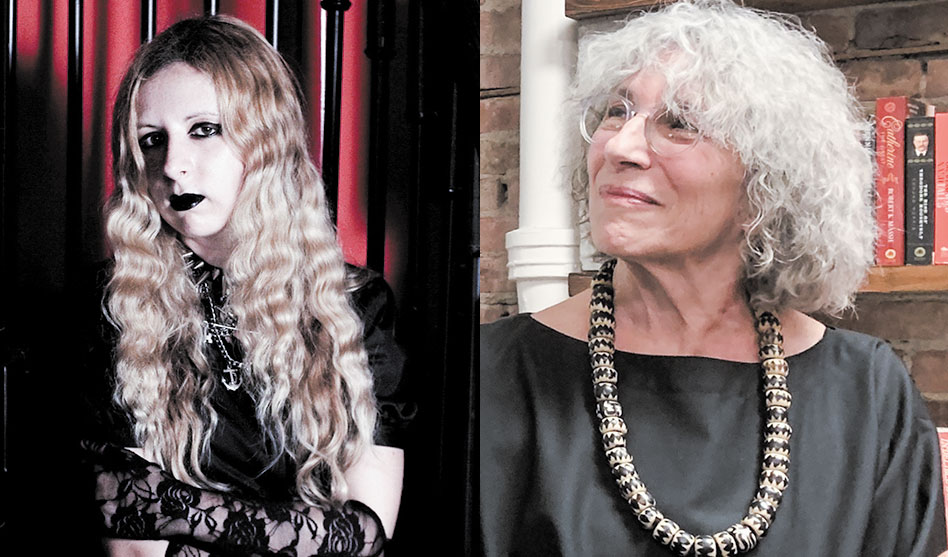Blue Hunger author Viola Di Grado, (Photo courtesy Corrado Lorenzo Vasquez),left and Gray Love eidtor Bauer-Maglin, right
‘Blue Hunger’ offers an excitingly dangerous romance abroad while ‘Gray Love’ explores the pitfalls and possibilities of dating after 60
TERRI SCHLICHENMEYER | Bookworm Sez
BookwormSez@Yahoo.com
 Blue Hunger by Viola Di Grado, translated by Jamie Richards. c.2023, Bloomsbury; $27; 216 pages.
Blue Hunger by Viola Di Grado, translated by Jamie Richards. c.2023, Bloomsbury; $27; 216 pages.
You can’t stop thinking about it. It’s been rolling around in your mind since it happened, and you can’t stop. You replay it over and over — how it started, how it progressed, why it ended. You wonder if it’ll happen again.
And in the new novel Blue Hunger by Viola Di Grado, you wonder if you truly want it to.
Shanghai was not her first choice to live. Sometimes, she wasn’t really even sure why she came there, except that it was Ruben’s dream.
For months and months, he spoke of Shanghai, showed her maps, talked of a life as a chef living in a high-rise apartment, taught her a little bit of the language.
She never fully understood why Ruben loved China, and she never thought to ask before her other half, her twin brother, her only sibling died.
She was brushing her teeth when it happened. Now, weeks later, she was in his favorite city, a teacher of Italian languages in a Chinese culture, alone, friendless.
Then she met Xu.
It happened at the nightclub called Poxx, and she later wondered, with a thrill, if Xu had been stalking her. Xu claimed that she was a student in the Italian class, but though she was usually good with faces, she didn’t remember the slender, “glorious” woman with milk-white skin and luminous eyes.
She did remember the first place she and Xu had sex. It was a hotel, but Xu liked it outside, too — in public, on sidewalks, in abandoned buildings and in crowded nightclubs. They took yellow pills together, slept together in Xu’s squalid apartment; she told Xu she loved her but never got a reply except that Xu starting biting.
Xu had used her teeth all along, but she started biting harder.
Soon, she was bleeding, bruising from Xu’s bites, and seeing people in the shadows. And she began to understand that Ruben wouldn’t have liked Xu at all.
You know what you want. You’re someone with determination. And you may want this book, but there are a few things you’ll need to know first.
Reading Blue Hunger is like watching a Stanley Kubrick movie. It’s surreal, kind of gauzy and loaded with meanings that are somewhat fuzzy until you’ve read a paragraph several times. And even then, you’re not quite sure about it.
Author Viola Di Grado writes of sharp, unfinished mourning with a grief-distracting obsession layered thickly on top, of control and submission. And, while the chapters are each brief, they feel too long but not long enough.
There are so many questions left dangling within the plot of this story, so many small bits unsaid, but also too much information of the mundane sort. You’ll feel somewhat voyeuristic with this book in your hands, until you notice that the sex scenes here are humidly uber-fiery but not very detailed.
Overall, then, Blue Hunger is different but compelling, short enough to read twice, quickly. It’s lush, dreamlike, and once started, you won’t be able to stop thinking about it.
 Gray Love: Stories About Dating and New Relationships After 60, edited by Nan Bauer-Maglin and Daniel E. Hood. c.2023, Rutgers University Press; $24.95; 303 pages.
Gray Love: Stories About Dating and New Relationships After 60, edited by Nan Bauer-Maglin and Daniel E. Hood. c.2023, Rutgers University Press; $24.95; 303 pages.
It was supposed to be a nice night out. But you drove around and around looking for the restaurant, and, once you found it, you learned that you needed reservations.
Practically before the evening started, you sensed that your food could be as cold as your date.
As in Gray Love, edited by Nan Bauer-Maglin and Daniel E. Hood, looking for love wasn’t like this when you were younger. You thought you’d be happy alone.
After the divorce, the funeral, the last break-up, you didn’t think a little you-time was a bad idea. And it wasn’t. But love — someone to go to the movies with or dine with or snuggle with — seems more and more appealing now. Today, though, as the 42 essays in this book confirm and as you’ve learned, that’s easier said than done.
You want a partner, someone your age, but you fear becoming a caretaker. You like doing your own thing, but having someone around to do it with would be nice. You have company, but you are “without intimacy.” Or you don’t want a full-time someone, but it’s scary to think about “falling off a ladder alone.”
So you go online because, well, people don’t meet like they used to. That’s when you learn that dating sites are generally rife with people who lie about their ages, who seem clingy or who want things you can’t give, “the Uncertain, the Angry… the Unattractive.” And — let’s be honest — the jerks.
Unlike real life circa 1973 or 1993, there’s nobody to vouch for singles online.
You wonder, “What would I wear?” You learn about scams the hard way, while tales of love at way-up-there-ages are inspirational. Experimenting with same sex, different sex, different race isn’t off the table, but nobody’s asked — or you did, and it was wonderful and why didn’t you do that before?
Love is love.
You date the wrong people; you date the right people, you’re exhausted and disappointed. And sometimes, even for a while, you’re someone’s “sweetie.”
According to a study quoted in Gray Love, about 25 percent of American adults live alone. If you’re one of them and open to a relationship, you need this book.
Just know that this is not a how-to manual. Editors Nan Bauer-Maglin and Daniel E. Hood don’t offer advice in their introduction, and most of their storytellers didn’t Ann-Landers their way into this book.
Instead, you’ll read tales of dating and mating gone happily right and very, very wrong, told in ways that will make you laugh, sigh and know that you’re not alone in your late-life search for love.
The mixture here is diverse and wide: If one tale makes you want to swear off dating forever, the next one offers Happily Ever After.
Be aware that a few of the tales inside Gray Love flirt with the explicit, and others might ruffle a feather or two. Still, it could be great to share it with a millennial or older GenZ-er. If you see this book on a bookshelf, take it out.

